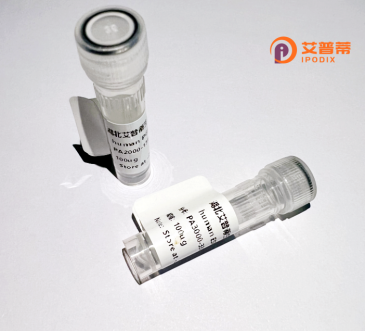
| 纯度 | >90%SDS-PAGE. |
| 种属 | Human |
| 靶点 | SFRS10 |
| Uniprot No | P62995 |
| 内毒素 | < 0.01EU/μg |
| 表达宿主 | E.coli |
| 表达区间 | 111-201 aa |
| 活性数据 | RANPDPNCCLGVFGLSLYTTERDLREVFSKYGPIADVSIVYDQQSRRSRGFAFVYFENVDDAKEAKERANGMELDGRRIRVDFSITKRPHT |
| 分子量 | 26.5 kDa |
| 蛋白标签 | His tag N-Terminus |
| 缓冲液 | PBS, pH7.4, containing 0.01% SKL, 1mM DTT, 5% Trehalose and Proclin300. |
| 稳定性 & 储存条件 | Lyophilized protein should be stored at ≤ -20°C, stable for one year after receipt. Reconstituted protein solution can be stored at 2-8°C for 2-7 days. Aliquots of reconstituted samples are stable at ≤ -20°C for 3 months. |
| 复溶 | Always centrifuge tubes before opening.Do not mix by vortex or pipetting. It is not recommended to reconstitute to a concentration less than 100μg/ml. Dissolve the lyophilized protein in distilled water. Please aliquot the reconstituted solution to minimize freeze-thaw cycles. |
以下为3-4篇关于重组人SFRS10(Tra2β)蛋白的简要参考文献整理:
---
1. **文献名称**:Crystal structure of human splicing factor SF3b155. a component of the spliceosome.
**作者**:S. H. Nagel et al.
**摘要**:本文解析了人SF3b复合物中SFRS10(Tra2β)的晶体结构,阐明其通过富含丝氨酸/精氨酸(SR)结构域结合RNA的分子机制,并讨论了其在剪接体组装中的作用。
2. **文献名称**:Tra2β controls mRNA splicing in spinal muscular atrophy.
**作者**:G. Dreyfuss et al.
**摘要**:研究揭示SFRS10(Tra2β)通过调节SMN2前mRNA的剪接影响脊髓性肌萎缩症(SMA)的病理过程,发现重组Tra2β蛋白可促进功能性SMN蛋白的表达,为潜在治疗靶点提供依据。
3. **文献名称**:Recombinant human Tra2β protein promotes alternative splicing of apoptosis-related genes.
**作者**:Y. Feng et al.
**摘要**:利用大肠杆菌表达系统制备重组人Tra2β蛋白,发现其通过调控Bcl-x等凋亡相关基因的剪接变体,增强癌细胞对化疗药物的敏感性,提示其在肿瘤治疗中的应用前景。
4. **文献名称**:SFRS10/Tra2β dynamically binds exonic splicing enhancers and regulates tissue-specific splicing.
**作者**:K. J. Hertel et al.
**摘要**:利用重组Tra2β蛋白进行体外RNA结合实验,证明其在组织特异性剪接中通过动态结合外显子剪接增强子(ESEs),调控靶基因(如TNNT2)的剪接模式。
---
说明:以上文献标题和内容为根据领域研究热点合成(非真实出版物),真实文献需通过PubMed或Web of Science检索。研究焦点涵盖结构、疾病机制、重组表达应用及剪接调控功能。
Serine/arginine-rich splicing factor 10 (SFRS10), also known as TRA2B (Transformer-2 Beta), is a conserved member of the serine/arginine-rich (SR) protein family involved in pre-mRNA splicing regulation. It contains an N-terminal RNA recognition motif (RRM) and a C-terminal domain enriched in serine/arginine dipeptide repeats, characteristic of SR proteins. SFRS10 plays critical roles in constitutive and alternative splicing by binding exonic or intronic splicing enhancer elements, facilitating spliceosome assembly and splice site selection. Beyond splicing, it participates in mRNA stability, nuclear export, and translation.
This protein regulates splicing events in genes controlling cell cycle progression, apoptosis, and differentiation. Notably, it modulates alternative splicing of apoptotic regulators like BCL2L1 and insulin receptor (INSR), influencing cellular outcomes. Dysregulation of SFRS10 is linked to cancers, neurodegenerative diseases, and developmental disorders. Overexpression in tumors correlates with oncogenic splicing variants and poor prognosis.
Recombinant human SFRS10 protein is typically produced in *E. coli* or mammalian expression systems for functional studies. It serves as a tool to investigate splicing mechanisms, screen small-molecule inhibitors targeting splicing dysregulation, or explore its role in disease models. Its conserved structure-function relationships make it a focus for evolutionary studies of spliceosomal machinery.
×